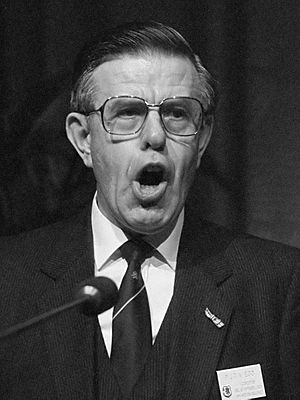Oud-Strijders Legioen facts for kids

The Oud-Strijders Legioen (OSL), which means "Former Warriors' Legion," was a Dutch organization for military veterans. It was active from 1958 onwards. Even though it was never a very large group or a political party, the OSL had a noticeable impact on Dutch politics. It was known for its conservative and nationalist views, especially in the 1980s and 1990s. Prosper Ego, a military veteran, led the OSL from the very beginning.
Contents
History of the OSL
How the OSL Started
The OSL was started in 1958 by Prosper Ego. He had served in the Netherlands Indies. Before the OSL, he was part of another veterans' group called the VLN since 1952. Prosper Ego and others left the VLN because that group wanted to take up arms after the Hungarian Revolution of 1956.
Who Joined the OSL?
The OSL was mostly made up of former soldiers. These soldiers had fought in the Indonesian National Revolution and the Korean War. The organization attracted people who were against communism. They also opposed the peace and anti-nuclear movements that became popular from the 1960s onwards. The OSL also supported the government of South Africa at that time.
OSL's Activities and Influence
At its busiest time, the OSL had about 14,000 supporters. In the 1980s, there were big protests in the Netherlands against nuclear weapons. The OSL organized its own counter-protests. They even flew planes over the demonstrations. These planes pulled banners with slogans like "Better a cruise missile in your garden than a Russian in your kitchen." This slogan showed their strong views against communism.
The OSL also published its own magazine called Sta-Vast ("Stand firm"). In the 1990s, Mat Herben, who later became a politician for the LPF party, was the magazine's editor. In 1995, he was fined for publishing an article that was considered unfair. Later, the organization changed its name to OSL Stichtingen. This longer name meant "OSL organizations for freedom and security."
OSL's Political Stance
The OSL never aimed to be a political party. It also never received money from the government, which is common for political parties in the Netherlands. Their main goals included wanting a strong military that could support itself. They also wanted to protect the country's democracy and its citizens' safety and property. The OSL also believed in a "powerful" foreign policy within the European Union and NATO.
As a conservative and nationalist group, the OSL offered a different option in the 1980s. Some people felt that the Centre Party, which was a leading right-wing party then, was too loud or extreme. Throughout the 1980s and 1990s, the OSL was one of the main critics of what they called "cultural permissiveness." This meant they were against changes in society they saw as too liberal.
In the 1970s and 1980s, the OSL influenced the more conservative parts of mainstream parties. These included the Christian Democratic Appeal (CDA) and the People's Party for Freedom and Democracy (VVD). In the 1990s, it also influenced the LPF, a populist party started by Pim Fortuyn.
Scaling Down and Restarting
By 2010, Prosper Ego was still the OSL's chairman. He began to reduce the organization's activities. He donated the group's historical documents to the Nationaal Archief, which is the national archive. The OSL officially closed its office in Rotterdam that year. At that time, it had about 2,400 members.
However, just a few months later, Ego announced that the organization had found new financial support. They restarted their website. Writers for the website included Mat Herben and Prosper Ego himself.
 | Charles R. Drew |
 | Benjamin Banneker |
 | Jane C. Wright |
 | Roger Arliner Young |


